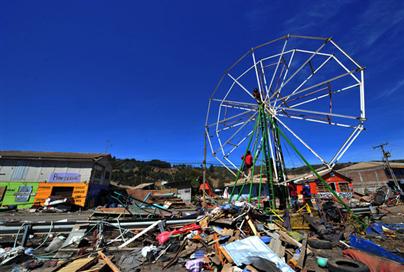The earthquakes in Haiti and Chile have told tales of death, but they have also told tales of survival. The latter was especially true for the Desarmes family, who survived the disaster in the Caribbean and, after seeking refuge with a relative in Chile, were again among the living when the dust settled.
Two weeks after the earth swallowed much of Haiti, the Desarmes family fled to Chile to live with their eldest son, the lead singer of popular Haitian band Reggaeton Boys.
"In Haiti, they got me out from under the ruins of a house, and I felt lucky to have survived," Joseph Desarmes, father to the family, told BBC News last week. "To come to Chile and go through the same situation, you can't imagine how I felt."
Upwards of 230,000 people perished in Haiti on Jan. 12, and up to 800 reportedly died in the Feb. 27 earthquake in Chile, which registered 8.8 on the Richter Scale.
That this family - two parents, their adult sons and their families, and three cousins - could survive these two earthquakes in a matter of less than two months has baffled onlookers. To be sure, not only is the Desarmes' story a mysterious exercise in probabilities, it also exposes some very real existential questions about fate, luck, superstition, and human psychology.
Douglas Wiens, a professor of statistics at the University of Alberta, said there is no magical, mathematical formula that could bring much clarity to these questions.
In this scenario, he said, even something as tangible and quantifiable as probability is murky.
"I don't know how you'd even begin to quantify the odds of something like this," Prof. Wiens said. "I suppose the odds might be approximately the square of the rate of surviving one earthquake. The bottom line, though, is that it seems extremely unlikely that a family could survive two huge earthquakes like this."
Surely, Prof. Wiens does not often speak of luck. As a statistician, "luck" is simply a layman's term to describe what is, in reality, a matter of probabilities and odds. But, when it comes to the Desarmes family, the former editor of the Canadian Journal of Statistics cannot help but talk luck - albeit in a way only a statistician would.
"I suppose they're lucky because they survived, but I suppose they're unlucky because they were in the wrong place at the wrong time twice," Prof. Wiens said. "But of the ones that were in the wrong place at the wrong time, they were lucky."
As it happens, the Desarmes family has company: Dachshund dogs Bella and Deiter lived through Hurricane Katrina, only to be adopted by Americans who moved to Haiti before disaster struck. The dogs survived again.
However, another disaster survivor was not so "lucky." Last summer, Johanna Ganthaler showed up late to the airport in Brazil and missed the ill-fated Air France flight that crashed and killed all 228 people aboard. Days later, Ms. Ganthaler died in a car accident.
John Leach, head of survival research for the Norwegian military and a member of the Centre for Research in Human Cognition at the University of Oslo, said these tales of death and survival have nothing to do with one another. There is nothing to connect them other than man-made "links," he said.
"Humans are pattern-recognizers - we like to seek and point out patterns," Mr. Leach said. "What we really should be asking ourselves here is, ‘Why shouldn't these people survive twice?'"
To that question, Mr. Leach pointed to Alistair Urquhart, a British veteran of World War II who last week went public with his harrowing tale of survival. Mr. Urquhart survived torture as a prisoner of war in a Japanese torture camp, then survived a ship being torpedoed, and then survived the atomic bombing of Nagasaki.
"Among survivors, there can actually be a certain feeling of invincibility," Mr. Leach said. "This will be more prevalent among youngsters, because youngsters often don't understand the concept of mortality to begin with."
Mr. Leach added that cultural factors, such as religion, will likewise affect how the Desarmes family reacts to cheating death on two counts.
"Haiti is a land of voodoo, and if this family practices voodoo, then they might respond with superstition," he said. "But really, it's just that some people survive earthquakes, and some people don't."
























Please wait while we process your request
Please wait while we retrieve the user's information
Bio
Your bio is currently empty. Now is a great time to fill in your profile.
This profile is private.
This profile is only shared with friends.
This profile is under review.
What Do You Think?
New to the site?
To leave a comment, you need to sign up.
SignupAlready a member?
Forgot Password? To comment, please login.
Please wait while we file your abuse report.
Report Abuse
Please wait while we send the email.
Email This
Score
vote upvotes up
vote downvotes down